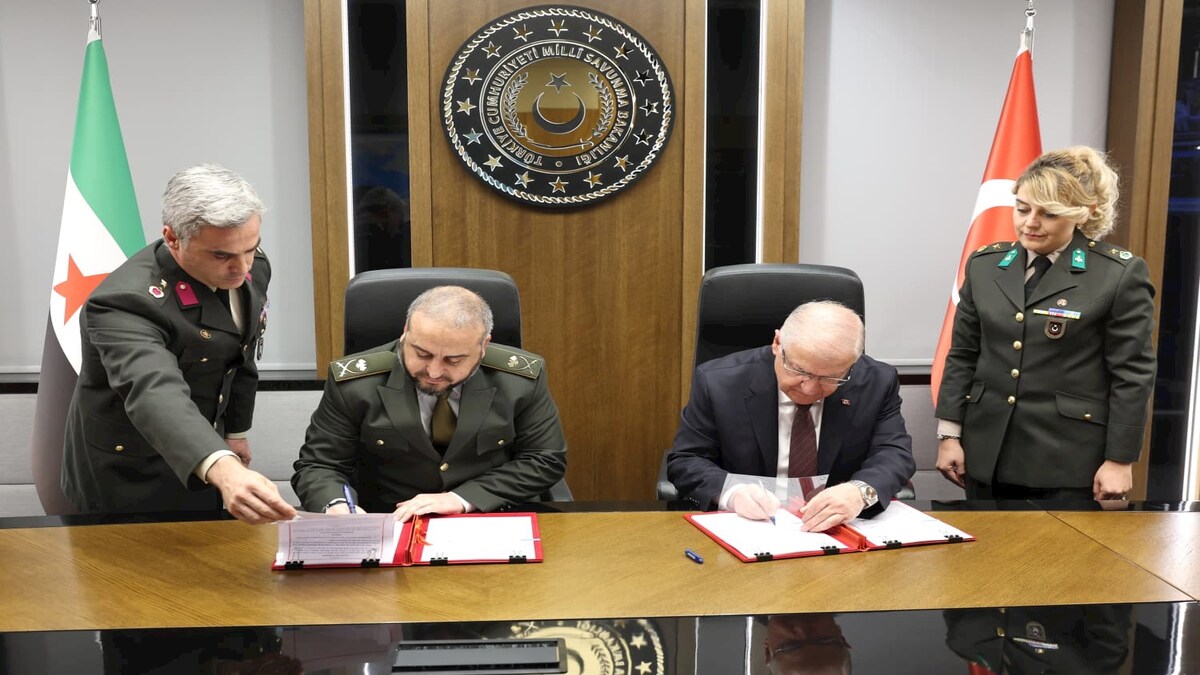The deal—described by Ankara as a “Joint Memorandum of Understanding for Training and Consultation”—was signed on Wednesday, August 13, following talks in Ankara between Turkish Defense Minister Yaşar Güler and a senior Syrian delegation comprising Foreign Minister Asaad al-Shibani, Defense Minister Marhaf Abu Qasra, and General Intelligence Directorate chief Hussein Salameh, according to statements from both defense ministries.
Syria’s official news agency (SANA) said the agreement aims to strengthen the Syrian army’s capabilities, develop its institutions and structure, and support a broader security sector reform process. It frames the program as a pathway to professionalize forces “according to international standards,” thereby reducing the risk of abuses by untrained factions.
Core Elements
Core elements, as outlined by SANA, include:
- Regular exchange of military personnel: Participation in specialized courses to raise operational readiness and enhance joint interoperability.
- Specialized skills training: Programs in counterterrorism, demining, cyber defense, military engineering, logistics, and peacekeeping, aligned with best international practices.
- Technical assistance: Deployment of expert consultants to support the modernization of military systems, organizational structures, and command capabilities.
The Turkish Ministry of Defense said the signing followed discussions on bilateral and regional defense and security issues. Ankara later reiterated support for Syria’s political unity and territorial integrity and endorsed the principle of “one state and one army,” according to Turkey’s Anadolu Agency.
A Pact Shaped by the SDF File
As Enab Baladi underlines, the agreement comes after unrest in As-Suwayda province in July and amid a standoff with the U.S.-backed Syrian Democratic Forces (SDF) in northeast Syria, where negotiations involving Damascus and Ankara have stalled. At a joint press conference with al-Shibani earlier on Wednesday, Turkish Foreign Minister Hakan Fidan warned that without meeting Turkey’s security demands, “maintaining calm will be impossible,” urging the SDF to stop what he called “direct threats to Turkey and the region.” Al-Shibani, for his part, cautioned against efforts to divide Syria along sectarian or ideological lines and pledged to pursue stability through dialogue.
Ankara has long said it is prepared to train the Syrian army. In December 2024, shortly after the political transition in Damascus, Türkiye signaled readiness to provide such support if requested by the new administration. Güler has previously said the presence of Turkish forces in Syria is aimed at preventing the country’s partition and blocking the emergence of a “terror corridor,” adding the issue could be discussed with Damascus if conditions allow.
A strategic Shift—Within Limits
Analysts view the memorandum as a notable shift in Turkey’s Syria policy. Mohsen al-Mustafa, a military-security researcher at the Omran Center for Strategic Studies, told Enab Baladi the deal marks a transition “from previous support for certain opposition factions to an institutional partnership with the Syrian state,” potentially bolstering Damascus’s role in internal security.
Yet prospects for a full-fledged joint defense treaty remain limited, al-Mustafa argues, citing obstacles including the legal framework governing the Syrian state, international reservations—especially concerning potential friction with Israel—and sensitivities tied to Türkiye’s NATO membership.
Hints of deeper cooperation have surfaced. Saudi outlet al-Sharq reported in late May that Syrian President Ahmad al-Sharaa and Turkish President Recep Tayyip Erdoğan held “advanced discussions” on a draft joint defense agreement during Sharaa’s visit to Ankara, including possible Turkish bases to support training for a “new Syrian army.” The meeting was held behind closed doors, and no official readout confirmed such details. Reuters has also reported that under the current memorandum, Türkiye would provide weapons systems, logistical support, and training as needed.
Even with added resources, a dramatic battlefield shift appears unlikely in the near term. Al-Mustafa expects potential deliveries to center on logistics platforms, light armored vehicles, surveillance and communications technologies, and possibly limited air defense support—incremental improvements that would not significantly alter the regional balance without more advanced systems and a conducive political framework.
Air Defense and the Israel factor
Regional reporting has pointed to an air-defense dimension. Middle East Eye said in April that Türkiye is preparing an air-defense base at the Tiyas (T4) airfield in Homs province, possibly deploying “Hisar” systems to deter Israeli airstrikes and bolster counter-ISIS operations in the Syrian desert. Such steps, if realized, could test Israel’s unofficial red lines. Former Israeli ambassador Michael Harari, writing in al-Majalla, warned of Tel Aviv’s concern over “excessive Turkish influence” in Syria and noted Israel’s implicit boundary against Turkish military presence beyond the north. Ankara, he argued, sees a historic opening to secure its border on its terms—especially against the PKK and affiliated groups—and to increase Damascus’s reliance on Turkey.
What’s Next
For now, the memorandum formalizes a pragmatic channel, including training exchanges, specialized programs, and advisory deployments, designed to professionalize Syrian forces and coordinate counterterrorism efforts. It also underscores Ankara’s prioritization of the SDF file, even as both sides calibrate their approach to Suwayda’s unrest and the risk of regional spillover.
Whether the accord deepens into basing rights or a joint defense framework will hinge on legal arrangements in Damascus, the posture of international stakeholders, and how far Ankara and Damascus are willing—or able—to push without igniting new frontlines.
Photo: Turkish Ministry of Defense, Enab Baladi
